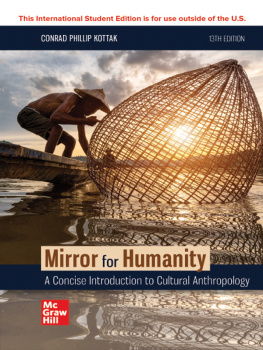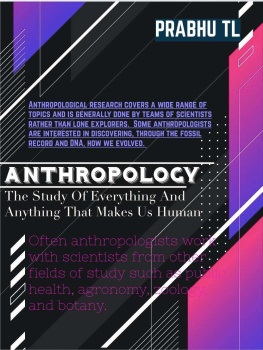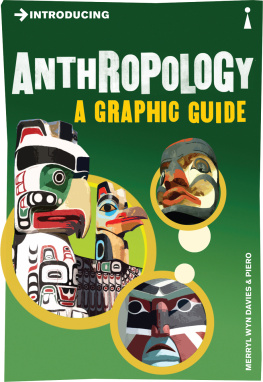
Anthropologys World
Anthropology, Culture and Society
Series Editors:
Professor Vered Amit, Concordia University
and
Dr Jon P. Mitchell, University of Sussex
Published titles include:
Home Spaces, Street Styles:
Contesting Power and Identity
in a South African City
LESLIE J. BANK
On the Game:
Women and Sex Work
SOPHIE DAY
Slave of Allah:
Zacarias Moussaoui vs the USA
KATHERINE C. DONAHUE
A World of Insecurity:
Anthropological Perspectives
on Human Security
EDITED BY THOMAS ERIKSEN, ELLEN BAL AND OSCAR SALEMINK
A History of Anthropology
THOMAS HYLLAND ERIKSEN
AND FINN SIVERT NIELSEN
Ethnicity and Nationalism:
Anthropological Perspectives
Third Edition
THOMAS HYLLAND ERIKSEN
Globalisation:
Studies in Anthropology
EDITED BY THOMAS HYLLAND ERIKSEN
Small Places, Large Issues:
An Introduction to Social
and Cultural Anthropology
Third Edition
THOMAS HYLLAND ERIKSEN
What is Anthropology?
THOMAS HYLLAND ERIKSEN
Anthropology, Development and
the Post-Modern Challenge
KATY GARDNER AND DAVID LEWIS
Corruption:
Anthropological Perspectives
EDITED BY DIETER HALLER
AND CRIS SHORE
Culture and Well-Being:
Anthropological Approaches to
Freedom and Political Ethics
EDITED BY ALBERTO CORSIN JIMNEZ
Cultures of Fear:
A Critical Reader
EDITED BY ULI LINKE AND
DANIELLE TAANA SMITH
Fair Trade and a Global Commodity:
Coffee in Costa Rica
PETER LUETCHFORD
The Will of the Many:
How the Alterglobalisation Movement
is Changing the Face of Democracy
MARIANNE MAECKELBERGH
The Aid Effect:
Giving and Governing in
International Development
EDITED BY DAVID MOSSE AND DAVID LEWIS
Cultivating Development:
An Ethnography of Aid Policy
and Practice
DAVID MOSSE
Anthropology, Art and Cultural
Production
MARUKA SVAEK
Race and Ethnicity in Latin America
Second edition
PETER WADE
Race and Sex in Latin America
PETER WADE
Anthropology at the Dawn
of the Cold War:
The Influence of Foundations,
McCarthyism and the CIA
EDITED BY DUSTIN M. WAX
Learning Politics from Sivaram:
The Life and Death of a Revolutionary
Tamil Journalist in Sri Lanka
MARK P. WHITAKER
ANTHROPOLOGYS WORLD
Life in a Twenty-First-Century Discipline
Ulf Hannerz
First published 2010 by Pluto Press
345 Archway Road, London N6 5AA and
175 Fifth Avenue, New York, NY 10010
www.plutobooks.com
Distributed in the United States of America exclusively by
Palgrave Macmillan, a division of St. Martins Press LLC,
175 Fifth Avenue, New York, NY 10010
Copyright Ulf Hannerz 2010
The right of Ulf Hannerz to be identified as the author of this work has been asserted by him in accordance with the Copyright, Designs and Patents Act 1988.
British Library Cataloguing in Publication Data
A catalogue record for this book is available from the British Library
ISBN978 0 7453 3048 8Hardback
ISBN978 0 7453 3047 1Paperback
ISBN978 1 8496 4565 2PDF eBook
ISBN978 1 7837 1377 6Kindle eBook
ISBN978 1 7837 1376 9EPUB eBook
Library of Congress Cataloging in Publication Data applied for
This book is printed on paper suitable for recycling and made from fully managed and sustained forest sources. Logging, pulping and manufacturing processes are expected to conform to the environmental standards of the country of origin.
10987654321
Designed and produced for Pluto Press by Chase Publishing Services Ltd, 33 Livonia Road, Sidmouth, EX10 9JB, England
Typeset from disk by Stanford DTP Services, Northampton, England
Printed and bound in the European Union by CPI Antony Rowe, Chippenham and Eastbourne
Acknowledgments
Most of the chapters in this book were not originally written to form an integrated and comprehensive treatise on what anthropology is now, or is not, or could be; in their first versions, they came into being as papers for conferences, or lecture series, or other edited volumes. These versions are identified in the endnotes for the particular chapters. As they appear here, however, the chapters have been extensively revised in order to fit better together, and to avoid repetition. Most of them have also been extended.
Let me take the opportunity here, however, to thank the members of those audiences who listened to early versions, and offered useful and generous comments: in Bayreuth, Berkeley, Budapest, Durham, Frankfurt am Main, Istanbul, Ljubljana, Poznan and Vienna.
Furthermore, I have been discussing the matters dealt with in this book, over the years, with a great many friends and colleagues, in many places. It would be impossible to remember all these conversations, and very difficult to draw a line around some smaller number of those conversation partners to be identified by name. It is at least a bit more manageable to thank collectively those circles of colleagues whose friendship, hospitality and intellectual company I have enjoyed in places to which I have had the pleasure of longer-standing links: in Stockholm, Vienna, Tokyo, Oslo, Tel Aviv and Jerusalem, New York and Oxford.
Finally, one close colleague deserves special mention, so let me do something probably seldom done in acknowledgmentsI will quote myself: In particular I am indebted to my wife and colleague, Helena Wulff Hannerz for her constant thoughtfulness, support, and willingness to listen, read, respond and ask for more (Hannerz 1992a: ix). True some twenty years ago, and still true.
Ulf Hannerz
Stockholm, February 2010
Series Preface
Anthropology is a discipline based upon in-depth ethnographic works that deal with wider theoretical issues in the context of particular, local conditionsto paraphrase an important volume from the series: large issues explored in small places. This series has a particular mission: to publish work that moves away from an old-style descriptive ethnography that is strongly area-studies oriented, and offer genuine theoretical arguments that are of interest to a much wider readership, but which are nevertheless located and grounded in solid ethnographic research. If anthropology is to argue itself a place in the contemporary intellectual world, then it must surely be through such research.
We start from the question: What can this ethnographic material tell us about the bigger theoretical issues that concern the social sciences? rather than What can these theoretical ideas tell us about the ethnographic context? Put this way round, such work becomes











